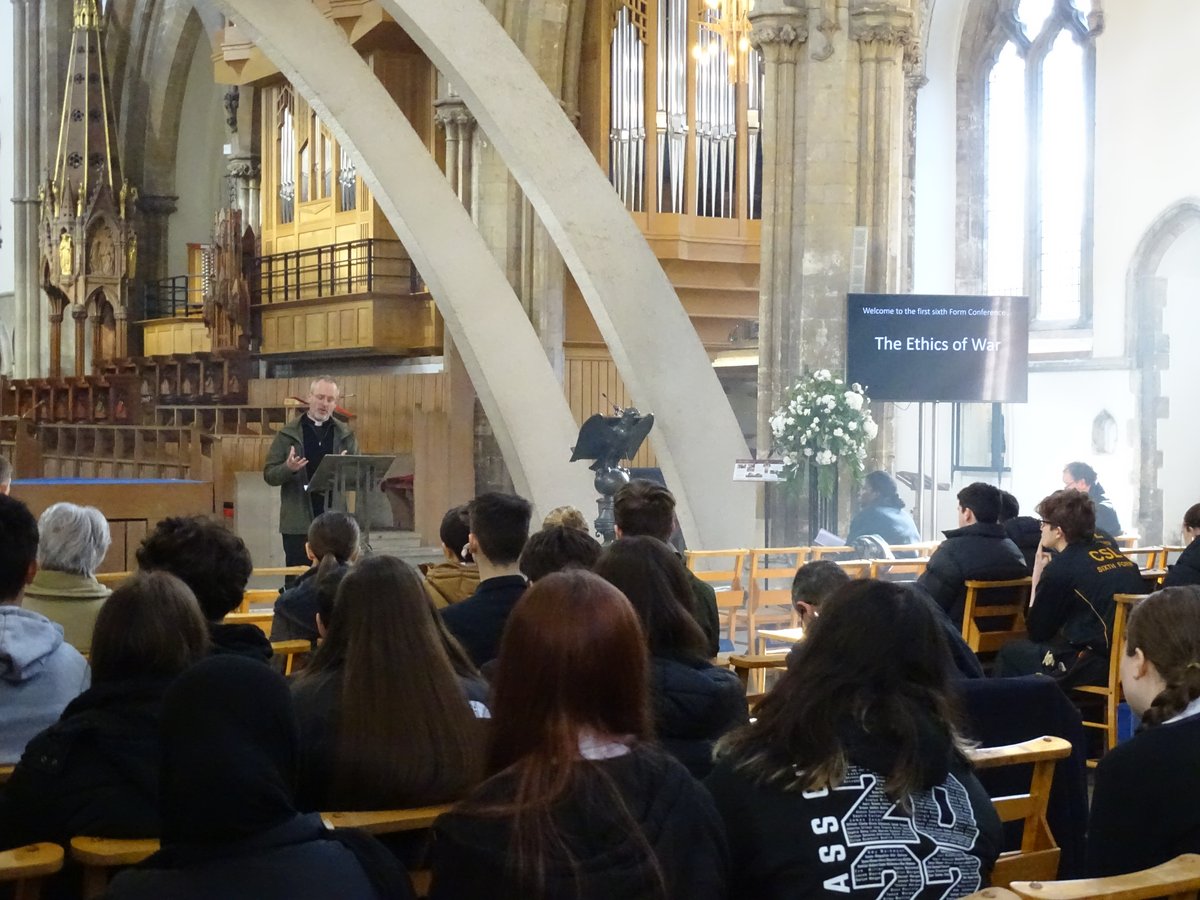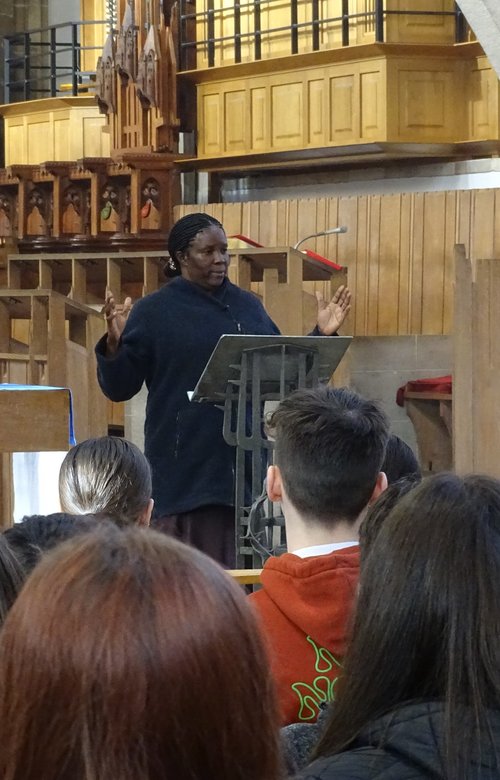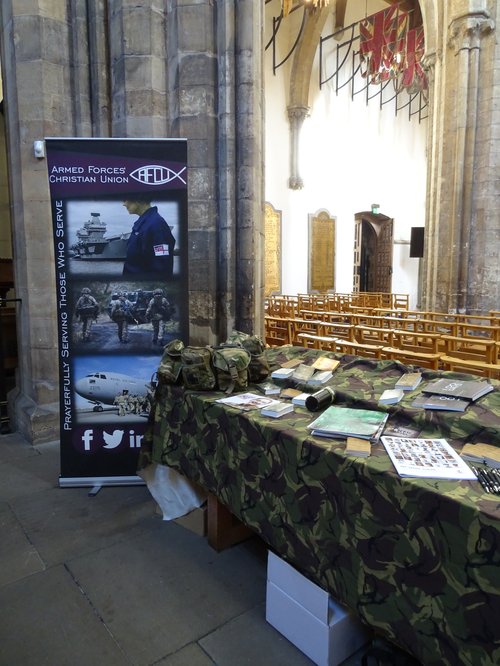Schools Hear From Soldier and Survivor at Cathedral War and Ethics Conference

Sixth form students from Llandaff schools debate war and ethics at cathedral conference.
Guest speakers from the armed forces, a cleric and a conflict zone survivor spoke to the students on the theological and moral questions of war.
Alex Allington is a Serving Officer from the 1st Queen’s Dragoon Guards who has recently returned from an operational tour in Mali, Africa. He gave a talk on what it is like to be a soldier.
He said, “I think this age group, especially in the modern world, is probably the most impressionable will get. In the sense of with social media, and the rise of mass communication, it's very easy to form an opinion from one dimension and having speakers all here today with all different life experiences and different angles and real-world experiences to draw from, I think provides next generation of leaders with a really good foundation of what to take away and what to take forward with them about how they feel in terms of some very pressing matters.”
Rev’d Dr Ryan Green gave his presentation on the ‘root causes’ of God and war. He said “I think it's really important in the Christian faith to address issues that really affect people in our world and I think our world is a place of instability and of difficulty.
“There's lots of violence around and we need to speak into that from a Christian perspective to enable young hearts and minds to respond and to learn how to think through these issues and how to address them.”
Phoebe Ayoo Obol is the Local Councillor for the Gulu District in Uganda. She told the sixth formers about her harrowing experience of losing her brother, mother and father to death and kidnapping in the war she grew up in.
She said “I have come to talk to the students about the impact of war, having lived through two decades of war myself.
"I'm here to say about my personal experience which I think is important because most of the time wars are distant from us, and we just hear about countries having wars, but we don't get first-hand experience about the effects of war or how long they last on people.”

Having flown over from Uganda in January, during her stay in the UK Phoebe is also addressing the Senedd on the Gulu Mission initiative which works to provide health care and education to her district which is still suffering the fallout from the twenty-year civil war in northern Uganda (1986 – 2006).
“I think sharing this first-hand will help when you're faced with situations of choosing war or not war. This kind of information is empowering. It enables our young generation to make informed decisions,” said Phoebe.
Ian Davis is the Lay Chaplain of Bishop of Llandaff High School. He said, “The benefit of this conference is the students get a balanced view from multiple perspectives. Many of us thankfully live in a very safe environment, and never have experienced conflict first-hand, been on the receiving end or even participated in the armed forces.
“It's very difficult to perhaps really understand what that feels like. When you hear different people who give real-life accounts of exactly how they see it, it helps create a more balanced view and help them understand how what different perspectives fit together.”
The students were from the Bishop of Llandaff’s school, St John’s and Cathedral high school and all study Philosophy & Ethics.
Lucy, a Christian student from St John’s Church in Wales High School was thinking about the power of prayer in war zones. She said, “ it gives them something to rely on and a sense of peace when they’ve got all this conflict and fall out and they need something that can ground them.”
Alex is part of the Armed Forces Christian Union and spoke about his experience of prayer in the field. “On my vehicle, we had the Armed Forces prayer printed off. I kept that on my vehicle all the time. As a serving soldier, you want every help you can get to keep yourself safe and sometimes when people feel powerless, like families back home, it is a very good comforter for your families to be able to feel that you're communicating the same way to the same power.”

Alex was able to attend to speak at the conference as he is currently between tours but will be heading back into the field. He spoke of a time on his most recent tour in Mali when prayer showed its power as a universal language.
“I came across a village down the banks of the Niger. It’s a Muslim country and we brought them a bit of stability there and reported what they needed. The Imam of the village said he will pray for me and my team’s safety for our duration in his country and thanked us.
"So not just for a Christian but I think the power of prayer is universal in the sense of when there's nowhere else to turn, your comfort can be found just by talking to God.”
Between presentations, the students used breakout groups for open discussions about the complex arguments and conundrums given by the speakers such as ‘can war ever be just?’, ‘where is God in war?’, ‘should countries intervene in other nations’ conflicts?’
Saran, also from St John’s school said, “I am thinking about whether war is too easy of an option. And whenever there's conflict, is it too easy now for people in power to say, ‘I'm just going to take you to war?’ Is that too easy of a decision or is it a complex decision which they think about? Do they realise the effects it can have after or do they just do it because they think it will give them the best outcome?”
When asked what she would like to say to political leaders, Saran said, “[Think about] the collateral damage, the people who are affected, the majority is affected by the minority’s decision. A group of two or three political leaders can decide three people can decide to take someone to war and that's a decision you can't take back and that will affect so many innocent people and the men and their families who have to go to war and risk their lives. People need to think about the collateral damage in all of the situations.”
Chaplin Ian said, “There are many aspects in the Bible where warfare is a key part of many stories, but there is also that spread of love and the lessons that Jesus taught us including how we can influence future generations through our own actions.
“Some people may vote in elections and have a key part to play, but that understanding of the Bible's teaching and how that matches up with the aspects we have in the world and war today may help with those inner thoughts. They may have inner conflicts themselves, regarding their own thoughts on their own particular ideas.”